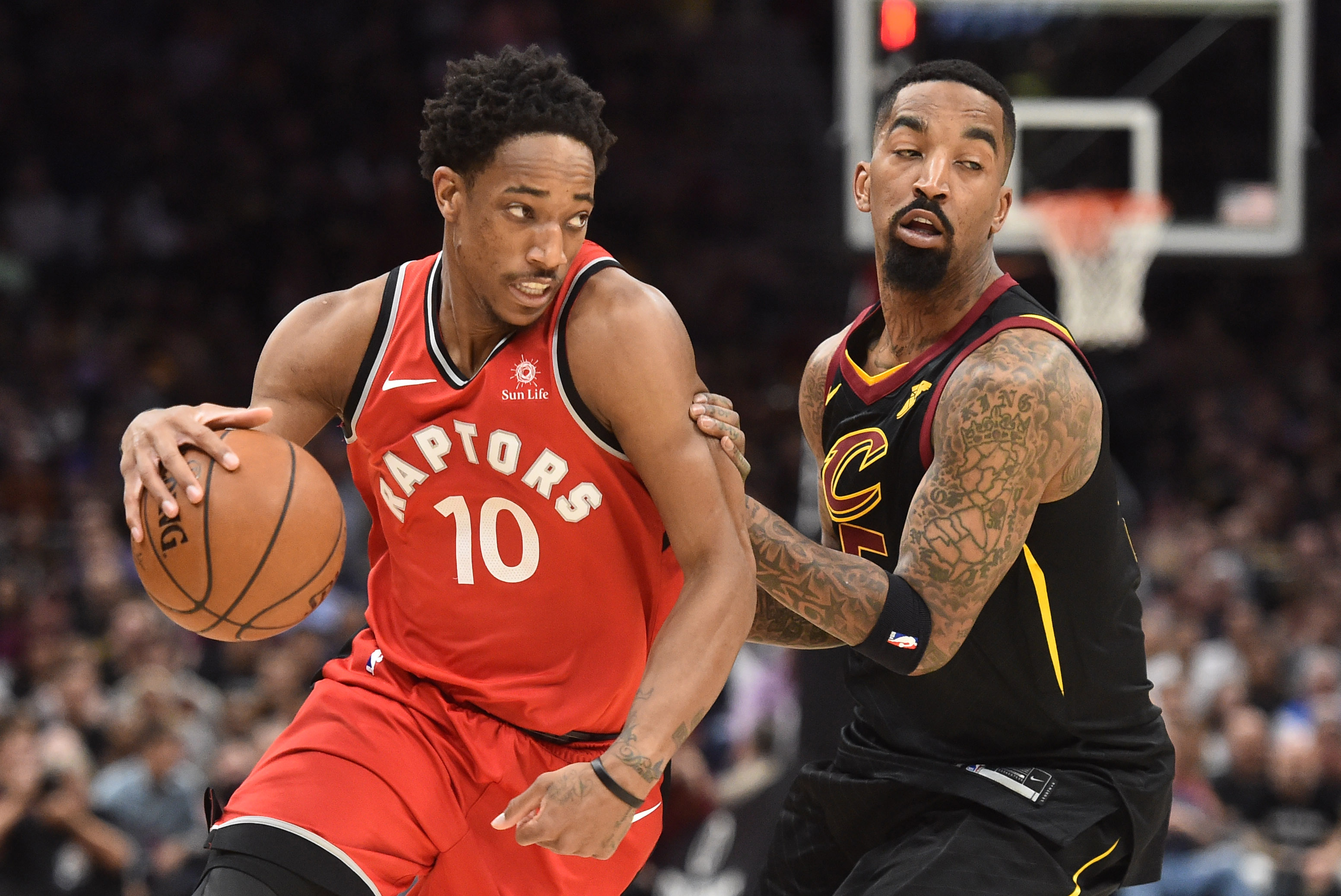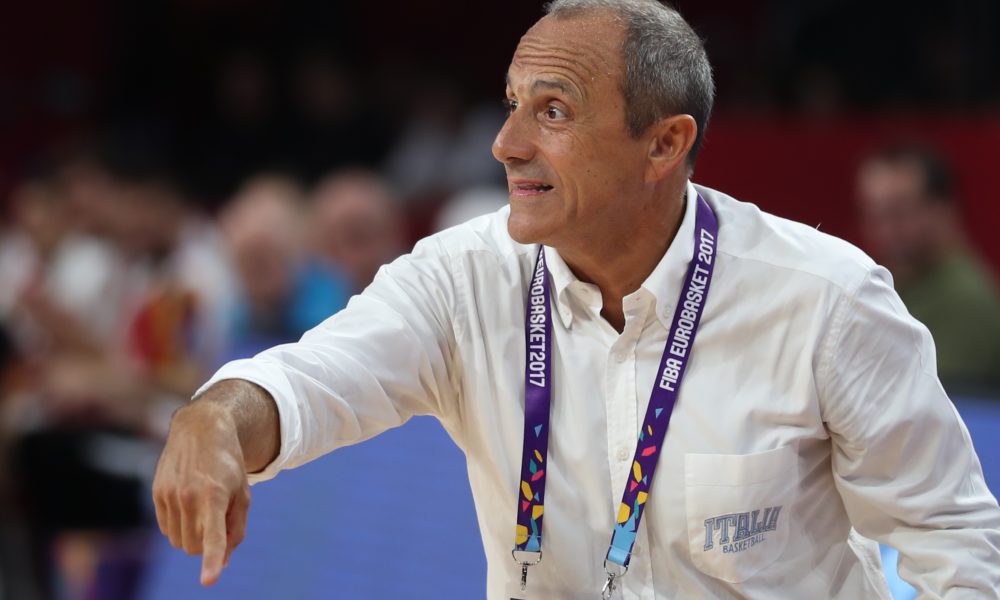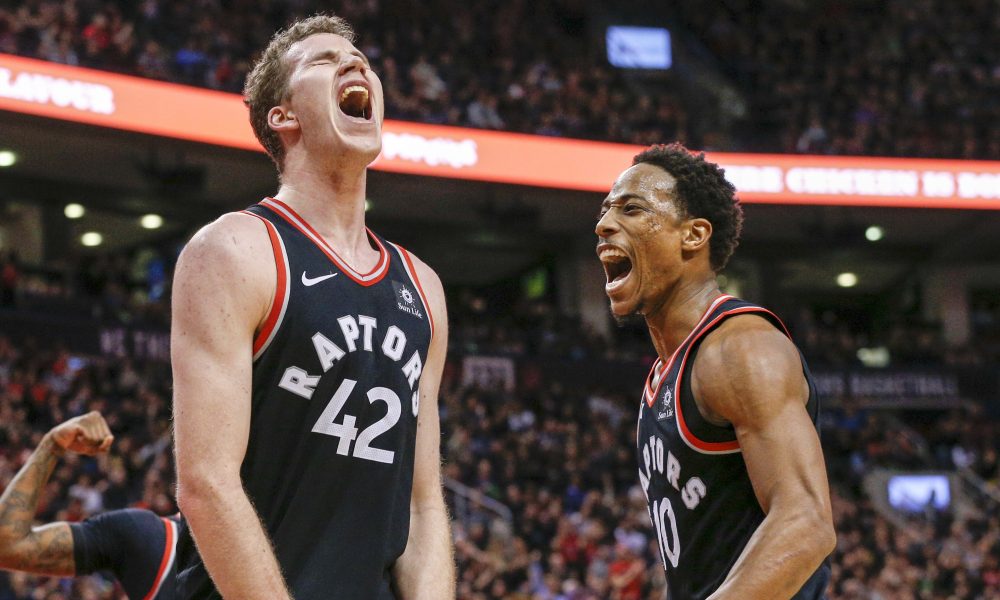You can keep up with all of our player reviews here.
It is always surprising (and often heartbreaking) to read or watch a story in which the protagonist fails. It’s why audiences stumbled out of theatres in 1980 shocked and appalled after witnessing Luke Skywalker’s hand being sliced off, and why there has been a similar reaction after Thanos recently shredded Earth’s Mightiest Heroes like rice paper.
It’s also why Toronto Raptors fans are still in a state of disarray, the recent eking out of an Eastern Conference Finals Game 7 by the same Cleveland Cavaliers who dispatched them with ease doing little to quell the feeling. The protagonist, in this case the entire Raptors roster, offered real hope over the course of the regular season (the best in franchise history) that they would finally be able to exercise past demons and slay the aforementioned Cavs in postseason battle, only to shrink and wither away when the moment actually arrived.
This failure of the protagonist is perhaps best exemplified by the season of DeMar DeRozan, whose 90 games were more than enough to cover the arc of a tragic hero. Unlike Skywalker or the Avengers, DeRozan wasn’t simply overcome by some greater force (though that could have been the case if the series had gone longer than four games and LeBron James had been pushed to the brink)—no, his tragic ending came at the hands of his own fatal flaw: His defense. DeRozan’s personal failure was a product of his limitations which he ultimately succumbed to.
Outside of the starting unit, no lineup that played significant minutes and contained DeRozan was good defensively against Cleveland. The Cavs hunted for poor defenders like DeRozan or C.J. Miles by forcing switches, and the Raptors often shot themselves in the foot by switching too much themselves off-ball or over-helping on James drives. Unlike Miles, however, DeRozan was and remains the Raptors’ second-best player, meaning that he had to play significant minutes and that former head coach Dwane Casey was definitely going to ride with him. Therefore, his Swiss cheese defense was a larger issue than anyone else’s on the team.
For the series, the Raptors had a net rating of -23.1 when DeRozan was on the floor, and a net rating of 16.8 with him off, by far the biggest swing of any single player. It didn’t help DeRozan that his offense fell off against the Cavs either, to the point that he had the lowest individual offensive rating (100.3) of anyone not named Lucas Nogueira (who only averaged 2.2 minutes in the series).
DeRozan’s fall from grace peaked in Game 3, when he shot just 3–12 to go along with his awful defense and Casey pulled him from the game to try a stronger defensive lineup to close the fourth quarter. That group (Kyle Lowry-Fred VanVleet-OG Anunoby-Miles-Serge Ibaka) nearly snatched a win, clawing their way back from a substantial deficit with Lowry and Anunoby leading the charge while DeRozan looked on.
A game later and DeRozan’s tragic arc was complete, getting tossed from what would be the season’s frustrating finale via a hard foul to Jordan Clarkson.
The searing pain that came from that sweep was only made possible by the dominant success of the regular season, and in typical tragic hero fashion, DeRozan started off with it all, achieving a level of newfound prosperity that beguiled the world into forgetting or willfully ignoring his fatal flaw.
Not enough can be made of DeRozan’s amenability at the beginning of the season when the Raptors decided they wanted to change things up so drastically that it became known as a culture reset. Along with Lowry, DeRozan agreed to the plan and the team worked to produce an entirely new offense, one that relied less on isolation basketball and instead focused on movement, passing, and screening.
Things weren’t easy for DeRozan (or Lowry) at first, but he continued to work his way into the offense, finding new ways to be effective. DeRozan has never been a particularly lethal off-ball player, and that didn’t change this season, but instead of remaking himself to such an extreme extent, he instead worked on his playmaking and wound up turning in his best passing season of his career. He averaged a career-high 5.2 assists per game, and he developed pocket passes, jump passes, and cross-court passes he’d never shown in his arsenal before. This allowed him to continue playing with the ball in his hands, with the club often allowing him to bring the ball up the floor as the primary playmaker, and helped keep him comfortable.
Unsurprisingly, the new offense did see DeRozan’s scoring numbers decrease, but that doesn’t mean he was any less of a high level threat. In fact, he passed Vince Carter for the most 30-point games in franchise history this season (he dropped 16 such games in 2017–18), and his 23.0 points per game ranked 11th in the league. He also shot a career-best 55.5 true shooting percentage, making this also his most efficient scoring season to date.
His offensive dynamism hit its apex on New Year’s Day, when DeRozan gave fans one of the greatest individual performances in Raptors history and dropped 52 points (breaking the scoring record previously held by Carter and Terrence Ross) on the Milwaukee Bucks in a 131–127 overtime thriller.
There were other moments, too—DeRozan has to be in the running for Dunk of the Year after what he did to poor Anthony Tolliver in Detroit, racing down the floor full-tilt with time running out and cramming home a two-handed hammer right in the Pistons player’s mug to help send the game to overtime, which the Raps would eventually win.
And then there are the awards and recognitions. DeRozan was selected to be an All-Star for the fourth time in his career, and he got to start in his hometown of Los Angeles next to some of the best players in the world. He was the NBA’s Player of the Week five times this season, and the Player of the Month once (the only East player other than LeBron James to receive the award). He most recently was voted to All-NBA Second Team, an honour that only he and Carter have enjoyed for the franchise.
Overall, the regular season was a resounding success, and DeRozan received more attention than he probably ever has by not only local media, but national media as well. Discussions raged about where he belongs in the Raptors pantheon, the team won a franchise-best 59 games, and when the dust settled the Raps owned the first seed in the East for the first time ever.
Amid all of this, DeRozan also became an outspoken advocate for mental health awareness (along with Kevin Love), revealing that he deals with depression. While his on-court game was flourishing, his off-court impact reached new heights as well, and droves of people came out in support of DeRozan and those battling mental illness. A group of Raptors fans even put together a book for DeRozan entitled Don’t Worry, We Got You, a reference to the Compton product’s famous “Don’t worry, I got us…” tweet from 2010, that shares stories and thanks him for speaking up about his experiences.
Yes, DeRozan’s fatal flaw came into play and tragedy befell him in the playoffs once again, but he also delivered Raptors fans the greatest regular season in team history. He had the best season of his career and it ended in four gut-wrenching losses—both things can be true.
And while it seems every season DeRozan arrives with something new or improved added to his game, it is unreasonable to expect him, in year 10, to enter training camp equipped with vastly refined defensive ability. By this point, DeRozan is a known quantity, and his limitations are what they are. Does that mean DeRozan can never be the best player on a title team? Probably. Does it mean he is a bad player? Not at all.
The answer, as always, lies somewhere in between. DeRozan is a very good player, and an extremely likeable person who has done a massive amount for the Raptors organization. He’s the face of the franchise, and for a lot of people, a hero on the hardwood.
But don’t blame fans for feeling shocked or appalled at how things played out. For them, DeRozan and the Raptors were their protagonist, a character they identified with throughout the story arc of the slog-fest that is an NBA season.
And, no matter what, it’s always surprising when the protagonist fails.



